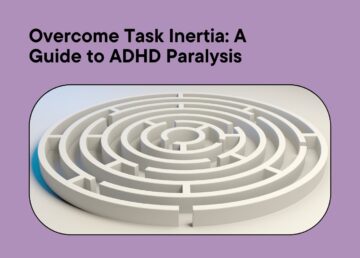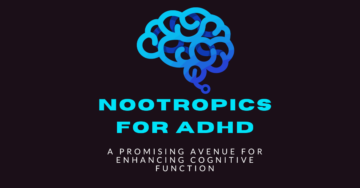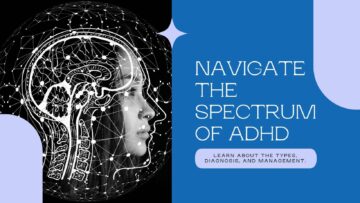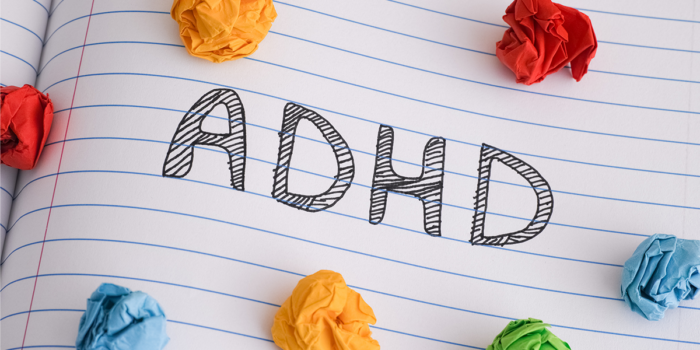
Attention deficit hyperactivity disorder (ADHD) affects millions of individuals – a study published in the Journal of Global Health estimates that more than 9% of adults worldwide live with ADHD.
While most people with this disorder can live regular lives, they usually find it challenging to focus, control impulses, manage daily tasks, and can experience other bothersome symptoms.
ADHD, being a neurodevelopmental disorder, is not curable. However, stimulants are a standard treatment for ADHD symptoms. Unfortunately, they aren’t suitable for everyone and may have side effects.
This article explores opportunities to treat ADHD without stimulant medication and provides alternative strategies, empowering individuals to take control of their ADHD treatment plan.
In this article
The Role of Medication in ADHD Management
Many individuals diagnosed with ADHD often begin their treatment with a pharmaceutical approach, including stimulant medications like Adderall or Ritalin, or non-stimulant drugs like Strattera or Intuniv.
These medications slightly alter the brain’s function and primarily work by increasing the levels of dopamine and norepinephrine. These neurotransmitters help individuals improve focus, attention, and impulse control.
Stimulant and non-stimulant medications are clinically proven ways to ease and manage various symptoms caused by ADHD.
Why Consider Non-Medication Treatment Options for ADHD
While medication is a proven way to ease ADHD symptoms, treating ADHD with medication might not be a suitable option for some. For example, people with heart conditions, uncontrolled high blood pressure, or a history of severe anxiety may be advised against using stimulants.
Additionally, individuals with a history of substance abuse or addiction may need to avoid certain ADHD medications due to their potential for misuse or dependence.
Potential side effects of medication
ADHD medication, like any pharmaceutical drug, comes with side effects. According to a study published in Psychiatry (Edgmont), 48% of surveyed individuals experienced side effects due to ADHD medication.
Common side effects include decreased appetite, difficulty sleeping, stomachaches, headaches, and increased heart rate or blood pressure. Stimulant medication may also cause irritability, mood swings, or anxiety.
Personal preferences and lifestyle considerations
Some also prefer to treat ADHD naturally and avoid pharmaceuticals. Some of the reasons why people seek natural treatments may be due to concerns about side effects, adverse interactions with other prescription drugs, or a preference for a therapeutic approach.
While ADHD medication is effective in treating ADHD symptoms, behavior therapy or neurofeedback can improve ADHD symptoms for people who want to manage their attention deficit hyperactivity disorder without relying on medication.
Enhancing overall health and well-being
It’s also important to understand that medication is rarely a cure-all strategy for most mental health conditions.
Other factors, such as an encouraging and supportive environment, a healthy diet, proper sleep hygiene, etc., play a crucial role in ADHD treatment. Hence, overall health is to be considered when aiming to manage symptoms.
How to Treat ADHD Without Meds: Natural Remedies and Holistic Approaches
Medication, although effective, can be out of reach for some people. Luckily, there are approaches to managing ADHD without medication.
While these strategies don’t cure the disorder, they can be effective in reducing ADHD symptoms and building skills to lead a distraction-free life.
Nutrient-rich diet and ADHD
While diet alone is insufficient to manage ADHD symptoms, a well-balanced, healthy diet can play a significant role. Certain nutrients, such as omega-3 fatty acids, iron, zinc, magnesium, and vitamin B6, have been found to have potential benefits for ADHD treatment.
These nutrients positively affect brain function, neurotransmitter production, and overall cognitive health. Whole foods, like fruits, vegetables, lean proteins, whole grains, and healthy fats, can provide the necessary nutrients to support optimal brain function and potentially help treat ADHD symptoms.
Moreover, avoiding highly processed foods, artificial additives, preservatives, and artificial colors might be beneficial, as they can contribute to hyperactivity and impulsivity. Foods high in sugar can lead to energy spikes and crashes.
Therapy options for ADHD
One of the most popular natural ADHD remedies is cognitive behavioral therapy. CBT is a form of therapy that focuses on identifying and changing negative thought patterns and behaviors. It can help develop strategies to manage impulsivity, improve organizational skills, and address emotional regulation.
Neurofeedback and EEG biofeedback aim to train individuals to self-regulate their brain waves and their activity. By providing real-time feedback on brainwave patterns, individuals can learn to modulate their brain activity and improve attention, focus, and self-control. Neurofeedback is a non-invasive and drug-free approach to treating ADHD naturally and is done with the medical professional’s supervision.
Mindfulness and meditation are also found to be effective in regulating impulsive behaviors, improving attention, and reducing stress. Regular mindfulness and meditation practice can enhance self-awareness, emotional regulation, and overall well-being.
Additionally, spending time in nature can positively affect ADHD symptoms. Being in natural environments can help reduce stress, improve attention, and promote calmness. Activities such as hiking, gardening, or simply spending time outdoors can provide a soothing and supportive environment for individuals with ADHD.
Importance of physical exercise in ADHD management
While hyperactivity is more often associated with children, it can manifest in adult ADHD as well. Stimming, shaking limbs, playing with hair, and other physical restlessness are the most common hyperactive behaviors.
Various types of exercise can be a useful treatment for soothing hyperactivity since physical activity increases the production of dopamine and norepinephrine. These neurotransmitters are often found in ADHD medications and help improve attention.
Moreover, exercise can help improve mood, sleep, and cognitive function and release pent-up energy. Activities such as running, swimming, heavy lifting, martial arts, and others can be a great way to soothe ADHD-induced hyperactivity without medication.
The role of sleep in ADHD management
Sleep is a vital activity for everyone and is one of the most effective natural treatments for a plethora of issues.
Adequate sleep and rest help regulate attention and impulse control. People with ADHD often experience difficulties with sleep, such as insomnia or restless sleep patterns.
Lack of sleep can worsen ADHD, leading to increased impulsivity, decreased focus, and heightened irritability.
Establishing a consistent sleep routine, creating a sleep-friendly environment, and practicing good sleep hygiene can help improve sleep quality.
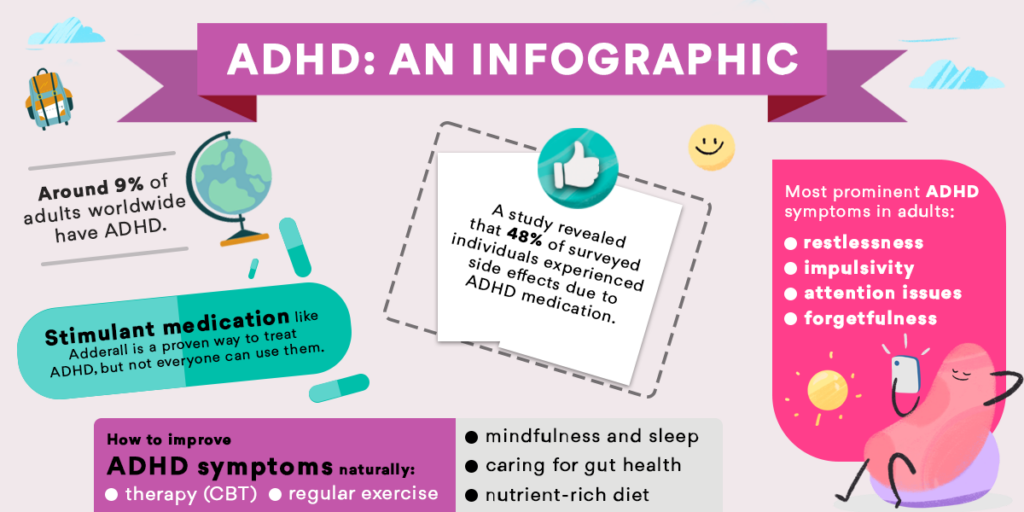
Other Strategies to Enhance ADHD Management
Maintaining a healthy lifestyle is beneficial for overall well-being, but there are less traditional but increasingly recognized approaches to treating ADHD.
These strategies may not be the first options presented by healthcare providers, but scientific and anecdotal evidence has shown that they can play a significant role in helping manage ADHD symptoms.
Managing ‘excitotoxins’
Excitotoxins are substances that overstimulate the brain and can worsen some symptoms of ADHD. By avoiding or reducing the intake of excitotoxins, such as artificial additives, preservatives, and high levels of processed foods, people with ADHD can experience improved focus and reduced hyperactivity.
Choosing a diet rich in whole foods and minimizing exposure to excitotoxins can support overall brain health and potentially alleviate ADHD symptoms. Consulting with a healthcare professional or nutritionist can provide further guidance in managing excitotoxins in the diet.
The Role of Antioxidants in ADHD
Antioxidants in foods like fruits, vegetables, and nuts help reduce inflammation, combat oxidative stress, and promote overall brain health. Including antioxidant-rich foods in the diet may support cognitive function and potentially alleviate some symptoms.
However, it is important to note that antioxidants alone may not be a solution to treating ADHD without medication.
Addressing gut health issues in ADHD
If you have ADHD, taking care of your gut can be essential – there is emerging evidence of a potential gut-brain connection. Research suggests that gut bacteria and intestinal inflammation imbalances may contribute to some symptoms of ADHD.
Focusing on gut health through dietary changes, probiotics, and addressing food sensitivities can positively impact ADHD and overall health. However, more research is needed to fully understand the extent of the gut-brain connection in ADHD and its implications for treatment.
How Sensa can aid in treating ADHD
Sensa, an app based on cognitive behavioral therapy (CBT), helps individuals with ADHD manage their symptoms without medication.
By providing valuable information on ADHD and offering tailored exercises, Sensa improves focus, organization, time management, and impulse control. With interactive tools like mood journaling and activity tracking, users gain insights into their emotions and establish healthy routines.
By integrating CBT techniques, Sensa equips individuals with practical strategies to overcome ADHD challenges, promoting self-awareness and a greater sense of control. Sensa offers a comprehensive approach to managing ADHD without medication, empowering users to lead fulfilling and focused lives. In addition to Sensa, we have compiled a list of other ADHD apps which can be helpful.
When to Seek Professional Help
However, sometimes addressing and treating ADHD on your own can prove to be ineffective. Therefore, it’s important to recognize the signs that you may need professional help.
Some common indicators include persistent difficulties with attention, impulsivity, and hyperactivity that significantly interfere with daily functioning and relationships. If you find it challenging to stay organized, meet deadlines, or complete tasks despite your best efforts, it can be a warning sign that you might need professional assistance.
Other signs include frequent forgetfulness, difficulty managing time despite best efforts, consistent struggles in academic or work settings, and impaired social interactions. If these symptoms persist and significantly impact your quality of life, reach out to healthcare professionals for a comprehensive evaluation and guidance.
Managing ADHD Symptoms Without Medication
Managing ADHD without medication is possible, and a diverse range of practical strategies exist. Non-medication treatments such as apps, lifestyle modifications, therapies, dietary changes, and holistic approaches empower individuals with ADHD to actively manage their mental health.
While a combination of holistic and pharmaceutical strategies is usually the most effective method to treat ADHD, everyone’s journey is different. Hence, exploring different avenues can lead to overall improved mental well-being.
Frequently Asked Questions
Can I treat ADHD without medication?
Addressing ADHD without medication can be effectively managed through various non-pharmacological approaches. Consulting with a doctor or mental health professional is essential to determine the most suitable treatment plan for you. Therapy can provide coping mechanisms and strategies to manage ADHD symptoms, including cognitive behavioral therapy (CBT) to identify and change negative thoughts and behaviors, and mindfulness therapy to enhance focus and manage stress. Lifestyle modifications, such as regular exercise, a balanced diet, and sufficient sleep, can also significantly improve ADHD symptoms.
How do you treat ADHD with lifestyle?
Managing ADHD with lifestyle changes involves implementing healthy habits like regular exercise, a balanced diet, adequate sleep, mindfulness practices, organizational strategies, environmental modifications, and stress management techniques. Consulting with a healthcare professional can help develop a personalized plan.
How can adults self help with ADHD?
Adults with ADHD can effectively manage their symptoms and improve their overall well-being through self-awareness, organizational tools, environmental modifications, positive self-talk, healthy lifestyle habits, and seeking support. Consulting with a therapist or ADHD specialist can provide personalized guidance and treatment plans.
How can I get free help for adults with ADHD?
Numerous resources offer free or low-cost support for adults with ADHD. These resources can provide education, counseling, and support groups to help manage ADHD symptoms and improve overall well-being.
- National Alliance on Mental Illness (NAMI): NAMI provides a range of free mental health resources, including support groups, online forums, and educational materials. They also have a helpline at 1-800-950-NAMI (6264).
- Children and Adults with Attention Deficit/Hyperactivity Disorder (CHADD): CHADD offers free and low-cost support services, including online resources, newsletters, and conferences. They also have a helpline at 1-800-233-4050.
- ADHD Online: ADHD Online provides a comprehensive online resource center with information, tools, and support for individuals with ADHD and their families.
- ADHD Foundation: The ADHD Foundation offers a variety of free and low-cost resources, including webinars, workshops, and support groups.
- ADHD Support Groups: Local ADHD support groups can provide a valuable sense of community and shared experiences. Search online for groups in your area.
In addition to these resources, many community mental health centers and hospitals offer free or low-cost counseling and support services for adults with ADHD.
References:
- Weiss, M., Murray, C., Wasdell, M., Greenfield, B., Giles, L. and Hechtman, L., 2012. A randomized controlled trial of CBT therapy for adults with ADHD with and without medication. BMC psychiatry, 12, pp.1-8.
- Antshel, K.M., Hargrave, T.M., Simonescu, M., Kaul, P., Hendricks, K. and Faraone, S.V., 2011. Advances in understanding and treating ADHD. BMC medicine, 9(1), pp.1-12.
- Ravenel, S.D., 2002. A new behavioral approach for ADD/ADHD and behavioral management without medication. Ethical Human Sciences and Services, 4(2), pp.93-106.
- Cherkasova, M.V., French, L.R., Syer, C.A., Cousins, L., Galina, H., Ahmadi-Kashani, Y. and Hechtman, L., 2020. Efficacy of cognitive behavioral therapy with and without medication for adults with ADHD: a randomized clinical trial. Journal of attention disorders, 24(6), pp.889-903.
- Sarkis, S.M., 2015. Natural Relief for Adult Adhd: Complementary Strategies for Increasing Focus, Attention, and Motivation With or Without Medication. New Harbinger Publications.
- Faber Taylor, A. and Kuo, F.E., 2011. Could exposure to everyday green spaces help treat ADHD? Evidence from children’s play settings. Applied Psychology: Health and Well‐Being, 3(3), pp.281-303.



